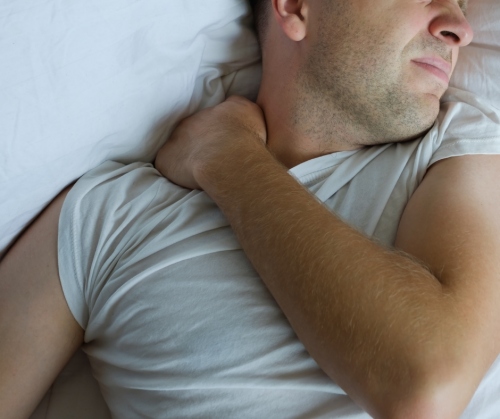Hello, my name is Sato and I run J-CLINIC, a physiotherapy and acupuncture clinic in Bangkok.
“I can’t lift my arms.” “My shoulder hurts, whether or not I move it.”

Today, I’ll talk about how J-CLINIC treats frozen shoulder, using an example of a client who couldn’t play golf anymore because of frozen shoulder.
If you have frozen shoulder, you might find that:
-
You can’t lift your arms as you’d like.
-
Your shoulder hurts.
-
You can’t reach your back with your arm.
-
When you turn over in your sleep, the pain wakes you up.
-
When you raise your arms, such as when washing your hair, it hurts.

Let’s now look at an actual case.
A patient case
Mr. H (51 years old, five years in Thailand) came to our clinic complaining of shoulder pain that made it difficult for him to raise his arms, even to change his shirt, and he couldn’t swing his golf club like he wanted.

We determined that Mr. H’s pain was caused by:
-
Age-induced degeneration of the shoulder-joint area
-
Reduced ligament flexibility
-
Inflammation of the shoulder-joint

In addition, fatigue had accumulated on Mr. H’s shoulders from golfing every weekend.
Because Mr. H wasn’t in the habit of exercising other than playing golf, his abdominal muscles were weak and his body was stiff. Mr. H also commuted two hours every day by car. The long hours of sitting pressured Mr. H’s lower body and disrupted his body balance.
Given the causes, J-CLINIC’s treatment for Mr. H comprised:
-
Massage to relax muscle tension
-
High-voltage electric therapy for pain relief
-
Motion & manipulation therapy to improve his range of motion
-
Rehabilitation
-
Advice on stretching and other exercises
▼ Watch our root cause treatments
For the first three weeks while the pain was strong, Mr. H came to J-CLINIC twice a week for treatment. Once the pain subsided, he also started stretches and strength-building in parallel with treatment to prevent the pain from recurring.
Thanks to the treatment, Mr. H recovered to the point that he could resume golf.
If you delay treating your frozen shoulder for too long, however, symptoms may worsen and affect not only your work and hobbies but also daily life activities such as getting dressed and washing your hair.
We thus recommend you get an early evaluation if you suffer from frozen shoulder.
And when once you start treatment, don’t stop just because the pain is gone. Be patient and continue with treatment until your frozen shoulder is completely cured.
If you suffer from frozen shoulder in Bangkok, we invite you to get in touch with us by phone, contact form, Facebook.
📞For Booking
- Phrom Phong: 097-257-3577
- Thonglor: 084-424-1299
- Ekkamai: 097-245-7863
Treatments for shoulder pains
- Shoulder muscle sprain
- Shoulder rotator cuff injuries
- Biceps tendinitis
- shoulder impingement syndrome
- Shoulder tendonitis
Past cases
- Physical therapy for ballet dancers
- Common problems for ballet dancers: Hip and knee joint pain
- Sprained playing soccer! Ligament damage
- What causes herniated discs and back pain?
- Post-surgery rehabilitation at J-CLINIC
- Treating sciatica
- Treating frozen shoulder
- Physical therapy for kendo practitioners
- Treating weight-training injuries
- Your stiff shoulders and headaches are caused by uneven shoulder blades?
What physical pains can be treated at J-CLINIC?
- Physical therapylower back pain, stiff shoulders, sciatica, headaches, knee pain, sprains, pulled muscles, whiplash, post-fracture rehabilitation and injuries from sports and accidents.
- Acupuncture treatmentPMS, irregular periods, insomnia, orthopedic diseases, headache, cosmetic acupuncture, eye strain, gastrointestinal problems.
Our branches in Sukhumvit road
- Phrom Phong Branch (Sukhumvit 31, RSU Tower Floor4)

From BTS Phrom Phong Station, take Exit 5 and walk along Sukhumvit towards Asoke for about 5 minutes. RSU Tower will be on your right. Take the escalator up to Floor 4 and you will see us right in front of you. If you are coming by car, parking is available at RSU Tower and is free up to 2 hours when you are treated at J-CLINIC. - Thonglor Branch (Soi Thonglor 13, Home Place building Basement Level)

Our Thonglor clinic is on the basement level of Home Place Building, at the corner of Sukhumvit Soi 55 and Thonglor Soi 13.
If you are coming by BTS, please take a taxi from BTS Thonglor Station, Exit 3.
If you are coming by car, parking is available at Home Place Building and is free up to 4 hours when you are treated at J-CLINIC. - Ekkamai Branch (Sukhumvit 42, Bangkok Mediplex Floor 3)

Bangkok Mediplex is a general medical mall on Sukhumvit Soi 42, across from Gateway Ekkamai and directly connected to BTS Ekkamai Station. J-CLINIC Ekkamai branch will be on the 3rd floor of Mediplex.
If you come from BTS Ekkamai Station, go through exit 2. It connects directly to Bangkok Mediplex. Take the escalator up to the 3rd floor and you will see our clinic on your right.
